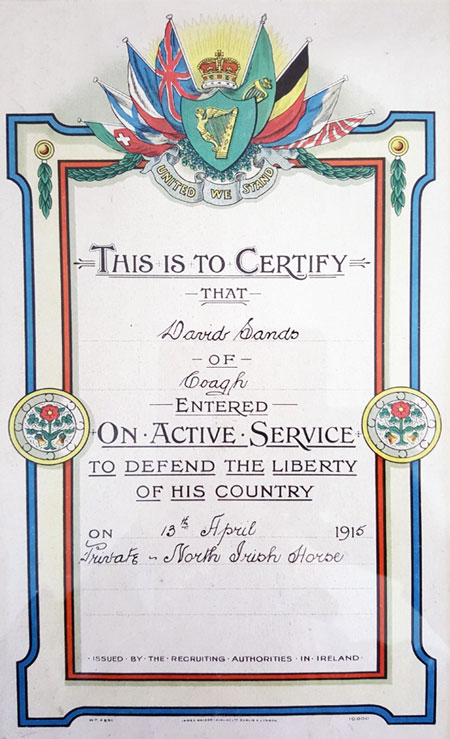Private David Sands
David Sands was born on 2 January 1897, the sixth of ten children of farm labourer William Sands and his wife Eleanor (née Marks). By the time of the 1911 Census he was living at nearby Mullaghtironey with his brother Robert on the farm of Mary Charleton, where they worked as farm servants.
Sands enlisted in the North Irish Horse on 13 April 1915 (No.1482). On 22 September 1915 he embarked with a reinforcement draft for France, where he was posted to C Squadron, which was then serving as divisional cavalry to the 3rd Division.
In June 1916 C Squadron combined with F Squadron and the 6th (Inniskilling) Dragoons Service Squadron to form the 2nd North Irish Horse Regiment, serving as corps cavalry to X Corps until September 1917, when the regiment was disbanded and its men transferred to the infantry. Sands was one of 70 men given the job of conducting the regiment's horses to Egypt, to be handed over for use by mounted units there. They embarked from Marseilles on board HMT Bohemian on 25 August. After a month at Alexandria they returned to France, via Italy. On 5 October 1917 they arrived at the 36th (Ulster) Division Infantry Base Depot at Harfleur for infantry training, and after just a few days were posted to the 9th (Service) Battalion, Royal Irish Fusiliers – which had been renamed the 9th (North Irish Horse) Battalion – joining it in the field at Ruyaulcourt on 12 October. Sands was issued regimental number 41595 and posted to D Company. He probably saw action with the battalion at the Battle of Cambrai in November and December 1917.
Sands was one of the many posted as missing following the 9th (NIH) Battalion's fighting withdrawal from St Quentin from 21 to 28 March 1918 during the German spring offensive. Later, however, he rejoined the battalion.
The 9th (NIH) Battalion saw heavy fighting on the Ypres front and east into Belgium during the Advance to Victory offensive from August to November 1918. Sands was wounded in the right foot at this time, probably in October. The wound was not severe, and on 7 March 1919 he was demobilised and transferred to Class Z, Army Reserve. For a year or so he received a disability pension due to the wound.

Private Sands' brother Robert also served in the war, with the Royal Inniskilling Fusiliers. He was killed in action on 8 May 1916.

Mid-Ulster Mail, 27 May 1916
David Sands' service certificate sourced from the site Friends of the Somme: Mid-Ulster Branch.
